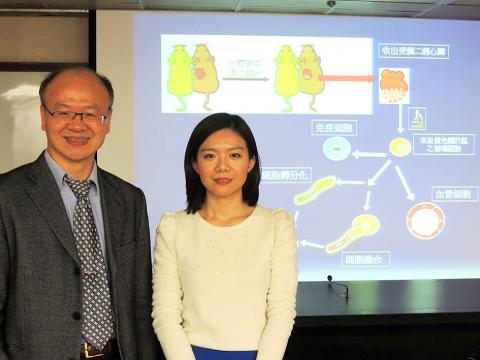Scientists from the Academia Sinica yesterday unveiled research findings that offer new hope for tools to combat heart failure.
They said five years of research showed circulating blood cells contribute to heart cell regeneration after a heart attack by fusing with heart cells (cardiomyocytes).
Team leader Patrick Hsieh (謝清河), an associate researcher at the Institute of Biomedical Science, said his team has discovered that heart inflammation triggered during the early stage of heart injury is essential for effective heart cell regeneration.

Photo: Tang Chia-ling, Taipei Times
However, their findings contradict those of a team led by former Stanford University researcher Bob Robbins — published in 2004 in the journal Nature — that said blood cells were unable to transform into heart cells, Hsieh said.
Robbins’ team used a parabiotic animal model — surgically joining two animals so that they share circulation, he said.
Hsieh said the difference in the two groups’ findings prompted him to experiment on the right timing to establish parabiotic circulation, so that early signals of inflammation in the heart can be promptly and effectively transmitted between test subjects.
By employing real-time molecular imaging in combination with Cre-Lox transgenic mice to pulse-trace blood stem cell genesis in the surgically conjoined animals, Hsieh’s team found that parabiosis between the rodents requires at least one week to become stabilized, he said.
Once that has been achieved, heart attacks can been induced in the recipient mice to achieve useful test results, Hsieh said.
The results showed that hematopoietic stem cells — the cells in charge of forming blood cells — of the label mouse begin to enter the recipient’s heart about one week after the recipient has had a heart attack, about which time the stem cells turn into heart cells by trans-differentiation and fusion with existing cells, Hsieh said.
He said the process, which also occurs in humans, begins at one week after a heart injury and is transient — something Robbins’ team failed to identify.
He said this team found two other flaws in the work by Robbins’ team — that from the beginning they used mice that had been given heart attacks, when parabiosis was still unstable, and then they waited up to a month before analyzing their results, which found that none of the label mice’s blood stem cells had circulated to the recipient’s heart.
Hsieh said his team’s discovery is significant because it successfully challenged the widely held view that no blood circulation cells can contribute to cardiomyocyte regeneration, as well as offering new prospects for preventing heart attacks.
Drugs developed based on his team’s discovery would significantly improve traditional therapies targeting heart failure, he said.
“Although we still have a long way to go, we hope to develop drugs to strengthen the process of hematopoietic stem cells entering the heart so that patients can benefit from natural, endogenous cardiomyocyte regeneration,” Hsieh said.

The Chinese military has built landing bridge ships designed to expand its amphibious options for a potential assault on Taiwan, but their combat effectiveness is limited due to their high vulnerability, a defense expert said in an analysis published on Monday. Shen Ming-shih (沈明室), a research fellow at the Institute for National Defense and Security Research, said that the deployment of such vessels as part of the Chinese People’s Liberation Army (PLA) Navy’s East Sea Fleet signals a strong focus on Taiwan. However, the ships are highly vulnerable to precision strikes, which means they could be destroyed before they achieve their intended

The first two F-16V Bock 70 jets purchased from the US are expected to arrive in Taiwan around Double Ten National Day, which is on Oct. 10, a military source said yesterday. Of the 66 F-16V Block 70 jets purchased from the US, the first completed production in March, the source said, adding that since then three jets have been produced per month. Although there were reports of engine defects, the issue has been resolved, they said. After the jets arrive in Taiwan, they must first pass testing by the air force before they would officially become Taiwan’s property, they said. The air force

GLOBAL: Although Matsu has limited capacity for large numbers of domestic tourists, it would be a great high-end destination for international travelers, an official said Lienchiang County’s (Matsu) unique landscape and Cold War history give it great potential to be marketed as a destination for international travelers, Tourism Administration Director General Chen Yu-hsiu (陳玉秀) said at the weekend. Tourism officials traveled to the outlying island for the Matsu Biennial, an art festival that started on Friday to celebrate Matsu’s culture, history and landscape. Travelers to Matsu, which lies about 190km northwest of Taipei, must fly or take the state-run New Taima passenger ship. However, flights are often canceled during fog season from April to June. Chen spoke about her vision to promote Matsu as a tourist attraction in

PAWSITIVE IMPACT: A shop owner said that while he adopted cats to take care of rodents, they have also attracted younger visitors who also buy his dried goods In Taipei’s Dadaocheng (大稻埕), cats lounging in shops along Dihua Street do more than nap amid the scent of dried seafood. Many have become beloved fixtures who double as photography models, attracting visitors and helping boost sales in one of the capital’s most historic quarters. A recent photo contest featuring more than a dozen shop cats drew more than 2,200 submissions, turning everyday cat-spotting into a friendly competition that attracted amateur and professional photographers. “It’s rare to see cats standing, so when it suddenly did, it felt like a lucky cat,” said Sabrina Hsu (徐淳蔚), who won the NT$10,000 top prize in